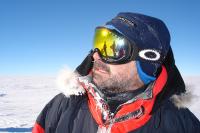Today we have yet another report about a far off place most people have never heard about being destroyed by the effects of global warming.
The massive Wilkins Ice Shelf in the Antarctic is collapsing.
The British Antarctic Survey (BAS) is reporting today that:
“Wilkins Ice Shelf is the most recent in a long, and growing, list of ice shelves on the Antarctic Peninsula that are responding to the rapid warming that has occurred in this area over the last fifty years.” [my emphasis]
Will this latest news make us think twice about jumping into our SUV‘s to go get a coffee from the Starbucks three blocks away?
Probably not. It is hard for most people to feel a connection to a place so far away.
For many, global warming is a distant dilemma. Seemingly it threatens only far off places and lives far removed from our own. We see fickle weather in our cities and towns, or the flooding in the Midwest or hurricanes, and we wonder for a moment, and then we move on.
But for Explorers, Global Warming is altogether different – it is something near and unmistakably immediate.
We stand on the mud and rock slopes of Kilimanjaro, for instance, where years before we clung to ice, and we take pause. Here, something terrible is happening. Higher up, hundreds of feet over head, the ice recedes like a retreating cloud sadly marked by a gray muddy mix of uncovered soil and run off.
We trek across desserts, each expanding from a seemingly unchecked disease. Here we see shifting sands claiming mile after mile of fertile soil. We arrive by foot expecting scruff grass, small trees and if we are lucky, water – yet find nothing but sand and its dunes marching tirelessly toward the horizon.
There is no mistake, we check our GPS – life has been evicted from this place.
We trudge though mud and swamps on plateaus where years before we dug holes in permafrost to store perishables. We are stopped in our tracks by seawater – the once solid Arctic ice no longer, well… solid. There is a moment of panic.
Once the territory of bears and part of the planet’s hard surface it is now churning black sea as dark as a pupil. We stand alone on the driest dessert on the planet, Antarctica, and watch in horror as snow piles up ceaselessly – something never seen before. For weeks we wander in snowy white out, fearing no only for ourselves, but the planet.
It is in the marginal landscapes of our world that people like me wander, and it is in these places that one sees and feels the things to come.
Sign up for Todd’s Expedition E-lerts and keep track of Todd’s Antarctic Expedition with live updates throughout the journey.
Subscribe to our newsletter
Stay up to date with DeSmog news and alerts







